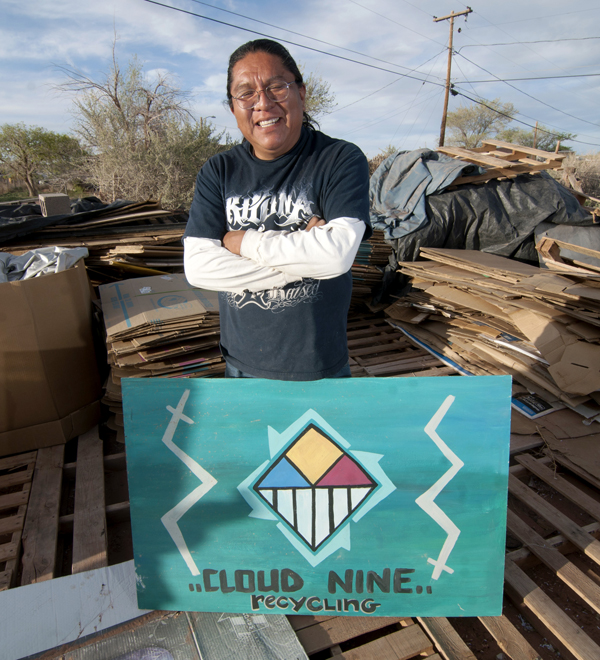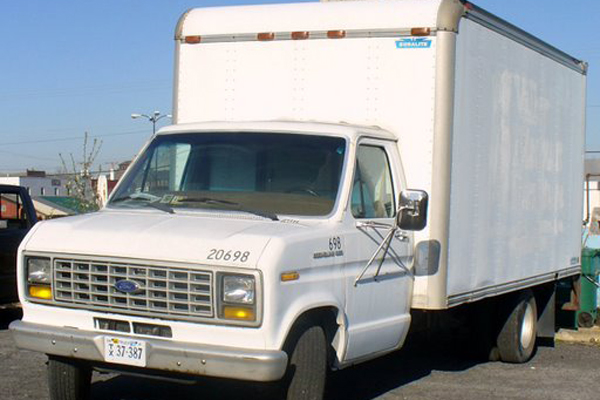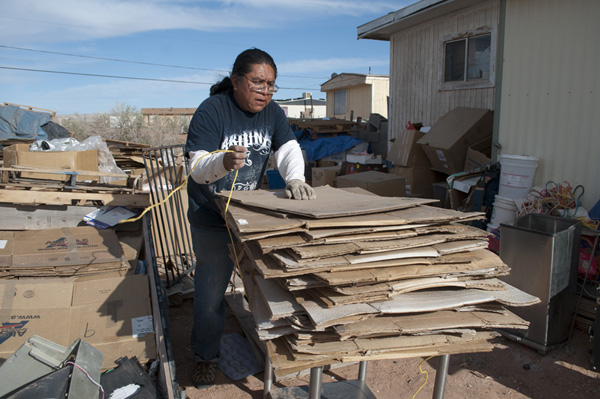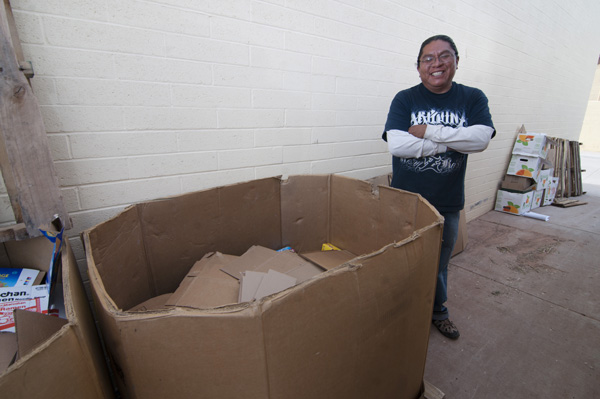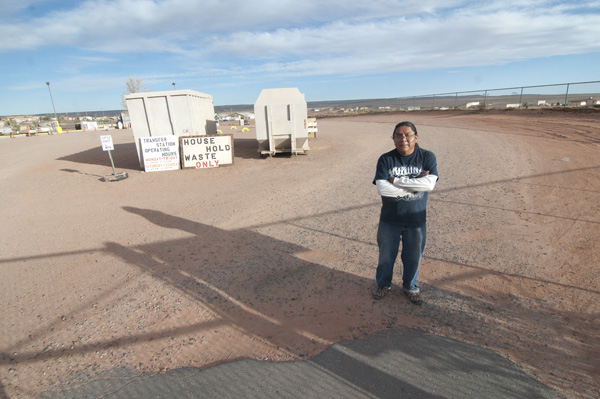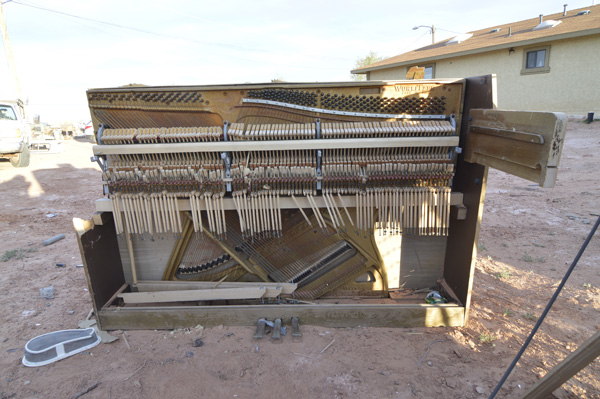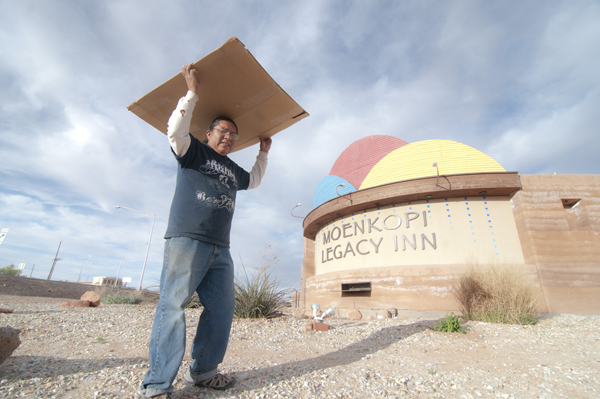Help Cloud Nine Recycling raise the $3,975 needed to buy its own recycling truck ›
DONATE
FOR IMMEDIATE RELEASE
Tuba City, Navajo Nation/Hopi Reservation (Arizona)—Hopi recycling entrepreneur Tyler Tawahongva is poised to make a big difference in the reservation town of Tuba City, creating a community-based small business model that employs fellow tribe members, protects the environment, and could be replicated across Native American reservations.
After ten years in the small business division of an American Express call center in Phoenix, Tawahongva returned to his native Tuba City, on the border of the Hopi and Navajo reservations in northern Arizona, and noticed a big problem: trash. The reservations, which combined are larger than Ireland, produce an estimated 300 million pounds of waste per year. Reservation governments have launched small recycling operations, and a few big corporations have moved to town, but most recyclables still end up in landfills. But where others see trash, Tawahongva sees opportunity.
Professional dumpster diver
“I’m the cardboard guy—people know me,” Tawahongva says. After working as a journalist and substance abuse counselor, in 2014 Tawahongva finally quit his day job to became a one-man recycling machine. He hires day laborers when cash flow allows, collecting and transporting over 40,000 pounds of cardboard and paper recycling in 2014 alone. Once a week, he empties the 40-foot recycling containers at the Tuba City waste transfer station (which overflow faster than the reservation government can empty them) and collects materials from local businesses and organizations, including the local food bank, hospital, and elementary school.
He’s transformed the dusty lot surrounding his trailer into a neatly ordered junkyard of cardboard, aluminum cans, plastic bottles, and disemboweled electronics which he mines for steel, aluminum, and especially copper wire, which can fetch over two dollars per pound. He then drives to Flagstaff, 80 miles away, rents a truck, drives back to Tuba City, loads it, and drives 220 miles south to recycling centers in Phoenix. With gas and rental expenses eating into his profits and the price of cardboard plummeting from over $100 per ton to $70, he’s been just barely breaking even, but that could be about to change.
Growing a green business in the desert
With the help of mentor Jessica Stago of the Native American Business Incubator Network, Tawahongva landed a Green Business in Indian Country Start-Up Award from Colorado-based NGO Trees, Water, People. Now a registered LLC with a website, the right to enter into contracts on the reservation, and an accounting structure in place, he’s refocusing Cloud Nine on harvesting metals from everything from small appliances to pianos. June 1, 2015, he will launch a 1-month crowdfunding campaign to raise the $5,000 he needs to purchase a used 13-foot box truck, eliminating rental costs and increasing his profit margin. He hopes to begin charging a small fee for pick-up.
“Tyler’s business model relies heavily on careful scaling of his business. Purchasing his own truck builds assets and increases efficiency. He will also have the capacity he needs to do business with local governments, organizations, and businesses who currently pay non-Native companies to haul away this material,” says Stago.
“Our Green Business Development in Indian Country Program really focuses on skill building and support for aspiring Native entrepreneurs. But no matter what we do, success lies in the individuals themselves. As our inaguaral start-up award winner, Tyler has done a great job channeling what he has learned into a strong forward-momentum for his business,” said Jamie Folson, national director of Trees, Water, People.
A rez model
Armed with a business plan and a year’s worth of expense tracking data, Cloud Nine would use the truck to work smarter and more profitably, with the goal of employing community members and training other Native entrepreneurs to launch similar recycling operations across the reservations, a region with unemployment over 40%.
“Natives are supposed to be stewards of the earth, so, for me, recycling seems like the natural thing to do. We need to start educating and bringing back that sense of responsibility to Native peoples,” Tawahongva says.
"Tyler was already doing the work; he just needed the connections and a team with some business expertise to help elevate him to the next level. He's filling a need in the community and he's creating his own job opportunity where he can support himself and his family. Our Native people want to see each other succeed and want to see our communities thrive," said Natasha K. Hale, Native America Manager for the Grand Canyon Trust "At NABIN, we are creating connections and building teams to do this in the small business realm.”
Photos ›
Resources
- Go Fund Me campaign
- Recycling on the Rez Tyler weighs in
- Interview with Tyler
- A Golden Opportunity

